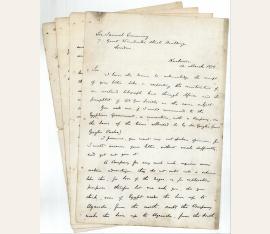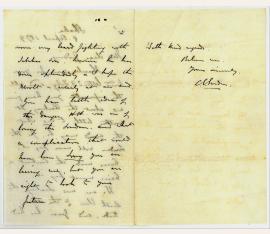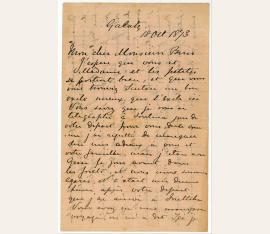known as "Chinese Gordon", "Gordon Pasha", and "Gordon of Khartoum", British Army officer and administrator (1833-1885). Autograph letter signed. Khartoum, Sudan. 12.03.1879. Folio. 4 pp. on 4 ff.
9.500 €
(76249/BN48911)
An important letter on the construction of an overland telegraph line through Africa, to the telegraphic engineer Samuel Canning (1823-1908), a pioneer in submarine telegraphy. Writing while serving as governor-general of the Sudan and engaged in the suppressing of the slave trade and the improvement of communications in the region, Gordon acknowledges the receipt of a letter from Canning on the construction of an overland telegraph line through Africa, and a Royal Geographical Society pamphlet on the same subject: "You ask me if I would recommend to the Egyptian Government, a convention, with a Company, on the basis of the terms alluded to by Mr.
Geigler (and Geigler Pasha). I presume you want my outspoken opinion [...] A Company for any such work requires some certain advantages. They do not enter into a scheme like this for love of the Negro or for exploration purposes. Therefore, let me ask you, do you think, even if Egypt made the line up to Uganda, from the north, could the Company make the line up to Uganda, from the south. Even if you did make the line, are you sure of keeping it safe, except with an armed force [...] I doubt entirely, in spite of all the explorers have written, that you could do either one or the other without an armed force. The explorers say this king will do this or that, but they have only the words to go on [...] I am to recommend to the Egyptian Govt. with respect to the extension of the Egyptian line, to Uganda. I would support this extension on the terms which Geigler Pasha has mentioned [...] I should wish to see a lot of penal clauses put in which might bring in the Egyptian Govt. the reproaches of the Counsel General [...] I would prefer the following scheme, which would not compromise Egypt: 1. that the Company should take all receipts for a term of - years, from Khartoum southward, and vice-versa, allowing the Egyptian officials [...] to telegraph free, from stations in Egyptian territory. 2. that the Egyptian Govt. should supply half the cost of labour [...] By this means, Egypt would avoid any chance of interference, by the Company, of by the Counsel General [...] There is no doubt that if the line from the South up to Uganda is not made, then the line from Khartoum to Uganda could be of no use [...]". - Some spotting..
known as "Chinese Gordon", "Gordon Pasha", and "Gordon of Khartoum", British Army officer and administrator (1833-1885). Autograph letter signed. Shaka. 08.04.1879. 8vo. 2½ pp. on bifolium.
3.500 €
(79067/BN50678)
To J. H. Gooding in Wadi Halfa, who was employed on the construction of the railway: "Thank you for your kind letter 23 July, and all the information you have given me about the Railway. It matters little to me what the award may be for the Sudan will never pay it. Cairo made the contract and Cairo must pay it. We are now dealing the death blow to the slave trade and Gessi has had some very hard time fighting [...], however he has done splendidly + I hope the revolt is nearly at an end. You have little idea of the danger H. H. was in of losing the Sudan and what a complication that would have been. Sorry you are leaving me but you are right to look to your future [...]".
known as "Chinese Gordon", "Gordon Pasha", and "Gordon of Khartoum", British Army officer and administrator (1833-1885). Autograph letter signed. Galatz [Galati]. 18.10.1873. 8vo. 3½ pp. on bifolium.
1.800 €
(79076/BN50831)
To a former Italian member of the European Commission of the Danube who had recently moved to Scutari, Albania, with his family. Gordon expresses his hope that Scutari is a "better exile" than Galati and underlines his regret that he could not personally bid farewell to the family, as he and his friend Romolo Gessi had got lost on a hike and returned too late: "Je espere que vous et Madame et les petites se portent bien, et que vous bien trouvez Scutari un bon exile mieux que l'exile ici. Vous savez que je vous ai telegraphé [...] pour vous dire comme j'ai regretté de manquer dire mes adieux à vous et votre famille.
mais j'étais avec Gessi le jour avant dans les forets, et nous nous sommes egarés, et c'etait une demie heure après votre départ que j'ai arrivé [...]". The letter continues with news from the members of the European Commission and Gordon announces his departure to Egypt to replace Sir Samuel Baker as Governor-General of Equatoria: "Ici je n'ai pas grandes nouvelles. Vous savez que [...] s'en va, et que Wolf viendra ici. [...] Schlechta ne revient plus, et je partirai en Egypte dans une mois pour remplacer Sir S. Baker sur Nile, un sujet que vous avec votre grande connaissance des choses generales savez plus que moi". The recent changes in the commission with many members leaving makes it easy for Gordon to part: "je serai tres bien aise de quitter la Commission". - Charles Gordon is today best remembered for the reorganization and successful command of the Chinese "Ever Victorious Army" during the Taiping Revolution (1860-62). In 1871 he was appointed British Member of the European Commission of the Danube. In Romania he again met Romolo Gessi (1831-81), an Italian soldier who had fought in the Crimean War alongside Gordon. Gessi accompanied Gordon when he assumed the position of Governor General of Equatoria (now part of South Sudan). In 1877 Gordon was appointed Governor of Turkish Sudan but left the post two years later due to difficulties with the new khedive of Egypt. Postings to India, China, Mauritius and South Africa followed. After a private sojourn in Jerusalem, where Gordon claimed the so-called "Garden Tomb" to be the burial site of Christ, he returned to Sudan as British commander in the Mahdist War (1881-99) and was killed in the Siege of Khartoum on 26 January 1885. - Folded and brittle. With several small tears (no text loss)..
verkauft
10 autograph letters signed.
Autograph ist nicht mehr verfügbar
Ten letters to J. H. Gooding in Wadi Halfa, who was employed on the construction of the railway. The letters show with great clarity the problems of building the railway. The first letter, dated 1 February, informs the recipient that his position was, reluctantly, going to become redundant due to lack of funds and large budget deficit: "We have no money to carry on the Railway to which the Sudan has contributed 75000£ this year, and for which we require still 18000£ to pay outstanding debts. Under these circumstances I would be glad to dispense with your services paying up all arrears and whatever may be due to you in your contract for your return passage, but I do not like to do so unless Mr Jansen consents […]" (July 1, 1878). - The third letter dated 23 March begins, "The works on the Sudan Railway must come to a close" and goes on to detail the reduction of staff and all other matters of saving costs. The fifth letter, dated 18 September, concludes, "The slave trade is giving me a lot of trouble". The sixth letter, dated 15th October, he is seeking to have the river mapped for a possible steamer service (being much cheaper than the railway). The postscript reads: "Directly I have money, I will see to your pay". The seventh letter, dated 15th November is very long, with a plan map of the river, he is seeking the possibility of passing some of the rapids and more questions with regard to the state of the railway. The other letter, dated 16 November concerns developing the project to run steamers along the stretch of river between Khartoum and Amara. The tenth letter concludes defeat of the railway project which was to be replaced by Haddens railway from Wadi Halfa to Amara and then use steamers on to Khartoum. The final letter includes the comment: "We are now dealing the death blow to the slave trade [...]". - Most letters were sent from Khartoum and there are three envelopes (2 stampless and one with stamp removed). A fascinating insight into this ill fated project due to lack of financial support from both Sudan and Egypt.


